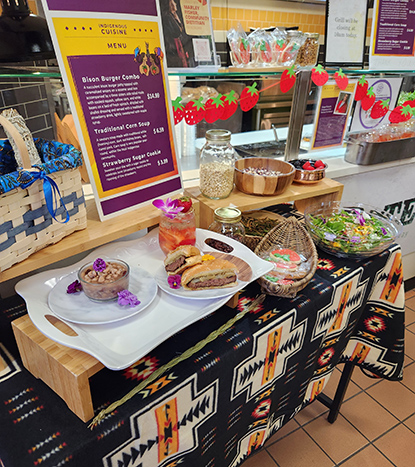Foods & Nutrition Alumna brings Indigenous dishes to the table
When Marley Fisher’s three-year-old daughter asked her to pick up ingredients for corn soup at the grocery store, she unknowingly highlighted the gaps that still exist for Indigenous Peoples.
“White hominy corn, used in the traditional Indigenous dish corn soup, is difficult to get,” said Fisher, a Registered Dietitian from Munsee-Delaware Nation and graduate of the Foods & Nutrition program now housed within the Brescia School of Food and Nutritional Sciences at Western University.
As a dietitian serving the Chippewas of the Thames First Nation and one of the few Indigenous dietitians in the region, Fisher is aware of the barriers Indigenous Peoples face in accessing traditional foods.
“We have to bring white corn in from other communities as it isn’t available in local grocery stores. But it makes you think, why isn’t it?”
Identifying gaps in Indigenous health

Marley Fisher, RD, CDE
Born and raised in Munsee-Delaware Nation, Fisher became interested in food and nutrition after a high school course introduced her to the relationship between food and the body. “I never thought about how food affected me until that class where I learned what happens to our bodies after we eat certain things.”
Fisher went on to Brescia University College, where she earned a Bachelor of Science in Food and Nutrition in 2017, followed by a Dietetic Education and Practical Training Diploma in 2019. The one-year professional, post-graduate program – now part of Western’s Faculty of Health Sciences – prepares students for the Canadian Dietetic Registration Exam.
After passing the exam in 2020, Fisher began working as a community dietitian on Chippewas of the Thames First Nation. In this role, she offers nutrition counselling services and nutrition and diabetes programming with an Indigenous lens.
“I knew I wanted to work as a community dietitian because I knew that way, I could work in First Nations,” said Fisher who is based at the Chippewas Health Centre. “I love doing programming and seeing someone for one-on-one counselling.”
Fisher is also passionate about exploring Indigenous aspects of food and nutrition and addressing gaps in Indigenous health.
“I want to create a better food environment for everyone to make healthy eating an easy choice. It involves so many factors including making it possible to eat and enjoy healthy foods, while also providing cultural and traditional choices.”
Recognizing the gaps that exist for Indigenous Peoples prompted her to consider ways to bring cultural choices to an urban Indigenous population.
When a chance arose this past spring, Fisher jumped at the opportunity.
Indigenous cuisine in hospital cafeterias
“I had been meeting with groups within London’s hospitals and mentioning how adding cultural food choices to the hospital menu would benefit Indigenous Peoples.”

Hospital cafeteria with Indigenous food available for National Indigenous Peoples’ Day
It was one of those meetings that connected Fisher with Compass One Healthcare – an agency responsible for the food within the cafeterias at St. Joseph’s Health Care London and London Health Sciences Centre (LHSC), including University Hospital.
Working alongside LHSC and Compass, Fisher was able to bring traditional Indigenous dishes to hospital cafeterias for National Indigenous Peoples’ Day on June 21. The specialty menu featured bison burgers with a three sister’s salad, a traditional strawberry drink and corn soup.
Under Fisher’s guidance, the event brought together a community-based Indigenous culinary group to provide guidance on the menu items and hired an Indigenous chef to prepare the meals. The money raised through staff and patient lunch purchases helped support an Indigenous culinary student at Fanshawe College. The collaboration and reciprocity made the event a success, Fisher said.
“There was a lot of involvement with Indigenous partners, so it really gave back to the Indigenous community.”
Building on the success of the event, Fisher is now working to have Indigenous cuisine included regularly on the hospital cafeteria menus. She hopes her advocacy helps all Ontarians recognize the importance of cultural foods.
“Indigenous Peoples need allies in the community. We’ve always known that we can’t get traditional foods like corn soup at the grocery store or in hospitals. It’s not about us knowing that these things need to be accessible but looking for allies who are willing to make it possible.”
Sharing Indigenous knowledge
Since graduating, Fisher has returned to her alma mater to share her knowledge with Food and Nutritional Sciences students as a speaker in the dietetic diploma program.
“I felt the need to share back with the students after I graduated. I now feel comfortable sharing about my life and experiences as an Indigenous woman.”
For her efforts, Fisher was recently awarded the inaugural Brescia School of Food and Nutritional Sciences Alumni of Distinction Award.
Fisher credits her time at the Southwest Ontario Aboriginal Health Access Centre (SOAHAC), where she was a summer student and later completed her internship as part of the dietetic diploma program.
“When I worked at SOAHAC, it was amazing to see doctors, nurses – many of them Indigenous – working in the health care field. Being able to see Indigenous Peoples in different roles helped me see myself in my career.”
Through her work in the Indigenous community, she hopes to inspire the next generation.
“There will be others like me in my community and when they see where I’m from, they’re going to see those possibilities too.”
Follow Fisher’s work at @marley.indigi_rd

